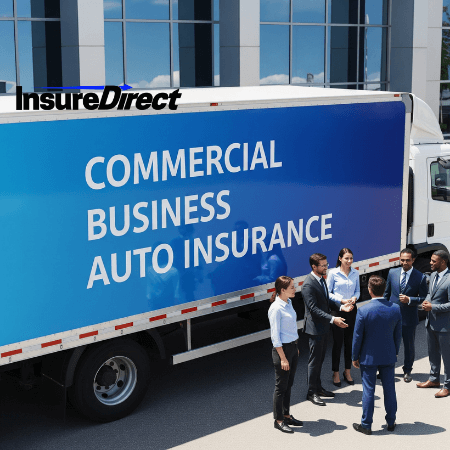I’ve been reflecting on just how essential commercial auto insurance is for businesses. Cars, trucks, and vans aren’t just vehicles—they’re valuable assets, operational tools, and sometimes ticking liabilities. Without insurance, even a small accident can cause financial chaos, stress, and legal headaches. I’ve learned this the hard way.
Why Commercial Auto Insurance Isn’t Optional
Personal auto insurance rarely covers work-related driving. Commuting? Maybe. Deliveries, client visits, or hauling equipment? No. Without proper coverage, a simple fender bender can lead to lawsuits, repair bills, medical costs, and more—all stacking up fast.
Commercial auto insurance acts as a financial shield for businesses. It covers damages, accidents, liability—essentially everything that can go wrong when your vehicles are on the road. And trust me, accidents happen.
In Pennsylvania, commercial auto insurance is legally required. Skipping it could lead to fines, legal trouble, or worse. Don’t find out the hard way.
Vehicles as Business Assets
Vehicles are major business investments. They’re not just metal boxes; they’re the backbone of delivery services, service operations, shuttles, and more. Crashing one without insurance can put your business at serious financial risk.
Comprehensive and collision coverage add flexibility. Comprehensive insurance isn’t only for crashes—it protects against theft, vandalism, fire, and other unforeseen events.
Types of Commercial Auto Coverage
Here’s what commercial policies generally cover:
Liability Coverage: Protects if your vehicle injures someone or damages property. Covers medical bills, repair costs, and potential lawsuits.
Collision Coverage: Pays to repair or replace your vehicle if it crashes into another vehicle, a pole, or any stationary object.
Comprehensive Coverage: Covers theft, fire, storms, vandalism, and natural disasters.
Medical Payments Coverage: Pays for injuries to drivers and passengers regardless of fault.
Uninsured/Underinsured Motorist Coverage: Protects your business if another driver has no insurance or insufficient coverage.
Pro Tip: Always read the fine print. Certain equipment, tools, or freight may require additional coverage. If employees use personal vehicles for work, Hired & Non-Owned Auto (HNOA) coverage is necessary.
Keywords: PA commercial auto coverage, business car insurance, fleet protection
Fleet Size, Vehicle Type, and Geography
Fleet size makes a big difference. Insurers treat a small fleet differently from a larger one. Larger vehicles, more mileage, and longer routes often increase premiums.
Location matters too. Urban driving has higher risks, while rural areas may be cheaper. Vehicle type and cargo matter—hazardous materials, fragile items, and perishable goods each influence rates.
Pro Tip: Keep detailed logs of all vehicles, drivers, routes, cargo, and mileage. It may feel tedious, but it prevents claim denials and surprise expenses.
Driver Hiring & Safety Policies
Hiring drivers without proper checks is risky. I once hired someone based solely on a recommendation. Within weeks, traffic violations and an accident occurred. It turned out he had prior DUIs and a suspended license.
Now, all drivers must go through:
Background check
Road test
Safety course (I designed a 15-minute program)
Safety policies and driver accountability not only reduce risks but also keep insurance premiums lower.
Keywords: hiring commercial vehicles, driver safety, insurance risk reduction
Bundling Policies: Smarter and More Cost-Effective
I used to pay multiple providers for liability, property, and workers’ compensation. An agent suggested bundling everything into a Business Owner’s Policy (BOP). The result? 15% savings, fewer calls, one policy covering all needs. Always ask about bundling. It saves money and simplifies management.
Annual Policy Reviews
Vehicles, routes, and mileage change regularly. Failing to update insurers can result in denied claims. Now, each December, I:
Confirm drivers
Confirm routes
Log mileage
Record vehicle uses
One hour, one email, and thousands of dollars saved.
Technology Can Reduce Premiums
Dash cams, GPS trackers, and telematics can lower premiums. I installed dash cams and GPS in half the fleet. Premiums decreased, and I can monitor driver behavior, which helps with safety and accountability.
Choosing the Right Deductible
Lowest deductibles feel safe but increase monthly premiums. Mid-level deductibles balance cost and risk. Pick a deductible your business can afford if a claim arises.
Professional Guidance is Key
Commercial auto insurance is complex. Overlapping policies, exclusions, and fleet-specific rules can be tricky. Hiring a knowledgeable broker ensures proper coverage, avoids costly mistakes, and provides peace of mind.
Additional Tips for Commercial Vehicle Insurance
Cargo Protection: Insure tools, equipment, and deliveries.
Accident Reporting: Prompt reporting prevents claim denials.
Emergency Kits: Prepared vehicles reduce accident severity.
State Compliance: Laws evolve—stay updated.
Driver Training: Frequent refreshers reduce accidents and lower premiums.
Final Thoughts: Protect Your Business on the Road
Vehicles are critical to your business. Insurance isn’t a luxury—it’s survival.
Review policies annually
Train drivers consistently
Bundle coverage when possible
Invest in technology to reduce premiums
Don’t underestimate liability
A single accident can undo years of work. Don’t gamble—protect your business.
Contact InsureDirect
For reliable commercial auto insurance and guidance:
InsureDirect.com
Corporate Home Office
618 South Broad Street
Lansdale, Pennsylvania 19446
Email: contact@insuredirect.com
Phone: (800) 807-0762 ext. 602
Keep your home, vehicles, and business safe with complete protection from InsureDirect—because your home and business deserve nothing less than the best.

